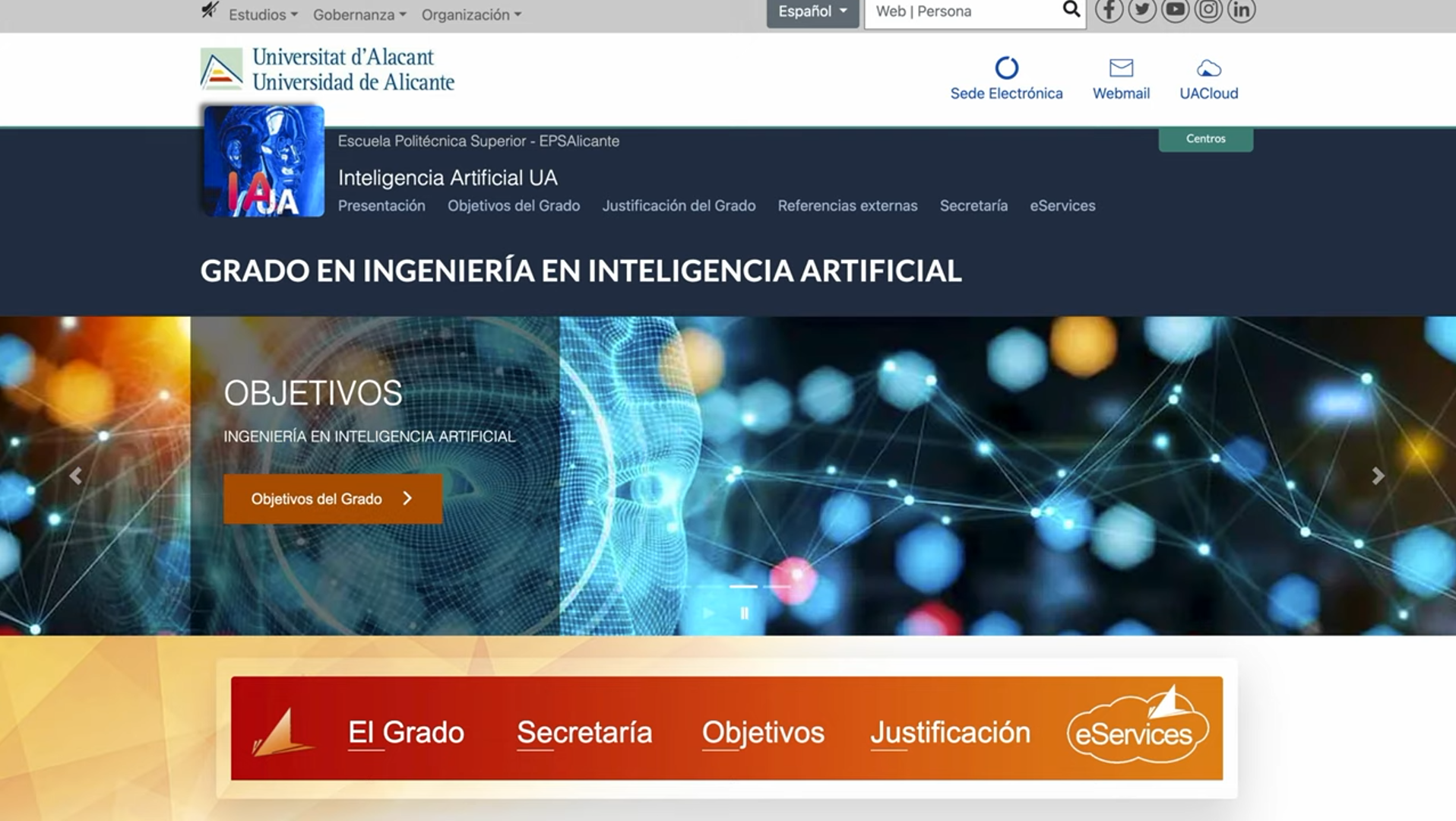Master’s Degree in Artificial Intelligence


University of Alicante.
The University of Alicante is a Spanish public university based in San Vicente del Raspeig, next to Alicante. It was created in 1979 on the structure of the Center for University Studies that began operating in 1968 and as heir to the University of Orihuela of 1569.
Campus: Universitat d'Alacant
Duration: 1.500 hours
Date: 2023/24
Method: Blended learning
Price: 35,34€/credit
Language: Spanish
Nowadays, Artificial Intelligence is at the center of an unprecedented technological revolution. Its application in various fields, such as data analysis, robotics, natural language processing, and computer vision, has driven significant advances in solving complex problems and improved efficiency across multiple industries. The growing demand from individuals interested in this topic is due to its relevance in today’s society, where data-driven decision-making and the development of intelligent systems are crucial for innovation and progress. Artificial intelligence is opening up a world of possibilities, and more and more people are seeking to acquire knowledge and skills in this booming field to be part of this exciting and transformative technological era.
In response to this demand, the University of Alicante presents the Master’s Degree in Artificial Intelligence. This program brings together the Escuela Politécnica Superior through the departments of Computer Languages and Systems, Computer Science and Artificial Intelligence, Information Technology and Computing.
Objectives
- Apply the knowledge acquired to real problems related to artificial intelligence.
- Be able to develop and learn in a self-directed or autonomous way subjects related to artificial intelligence.
- Know how to develop in multidisciplinary and/or international contexts providing solutions from the point of view of artificial intelligence.
- Know and apply in each situation the social, ethical and legal responsibilities linked to the application of artificial intelligence knowledge.
- Know how to manage the information and resources available related to artificial intelligence.
- Be able to adapt to environments related to artificial intelligence, fostering teamwork, creativity, critical capacity and entrepreneurial spirit.
- Be able to adapt to the changing environment of the discipline and to understand and apply new technical-scientific advances related to artificial intelligence.
- Know how to plan, design, develop, implement and maintain products, applications and services related to artificial intelligence, taking into account technical, economic and deficiency aspects.
- Know how to manage projects related to artificial intelligence, complying with current regulations and ensuring the quality of the service.
- Be able to use engineering principles and modern computer technologies to research, design and implement new applications of artificial intelligence.
Adressed to
The recommended entry profiles are those who hold the following degrees:
- Holders of a degree in Engineering/Bachelor’s degree/graduate degree in Computer Science.
- Holders of a Bachelor’s Degree in Multimedia Engineering.
- Holders of a degree in Robotics Engineering.
- Holders of a degree in Biomedical Engineering.
- Holders of a Bachelor’s Degree in Sound and Image Engineering in Telecommunications.
- Holders of a related engineering degree.
- Assessment criteria.
For all those who meet the above criteria, the average academic record will be taken into account in order to establish an order of applications. If there are more applications than places, this order will be used. For those who accredit a qualification other than those listed above, the Master’s Academic Committee will be responsible for assessing their acceptance based on the candidate’s academic and/or professional profile, always guaranteeing that the student has the minimum necessary Mathematics and Programming skills to be able to take the subjects of the master’s degree.
Career Opportunities
The applications of Artificial Intelligence are expanding to a multitude of domains. The impact that Artificial Intelligence has and will have in the coming decades in the different sectors of the economy (as justified above) together with the need for its practical application in companies, augur that the demand for AI training will come from innumerable sectors.
Graduates of this master’s degree will be able to create complete solutions based on Artificial Intelligence using the methods, technologies, tools, infrastructures and platforms necessary for its development and implementation, in such a way as to add value in many different fields.
Graduates of the master’s degree in Artificial Intelligence can enter various sectors of the world of work, such as industry, agriculture, tourism, health, the financial sector, government, transport, construction, entertainment and, in general, any sector that can improve and optimise information, products, services and processes through the use of Artificial Intelligence.
Graduates of this master’s degree will also have a direct entry into the world of research to continue their training and join the R&D departments of companies of all kinds or in academia as a researcher or lecturer.

